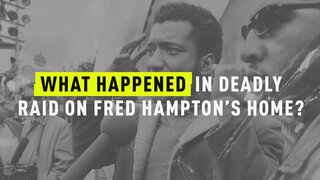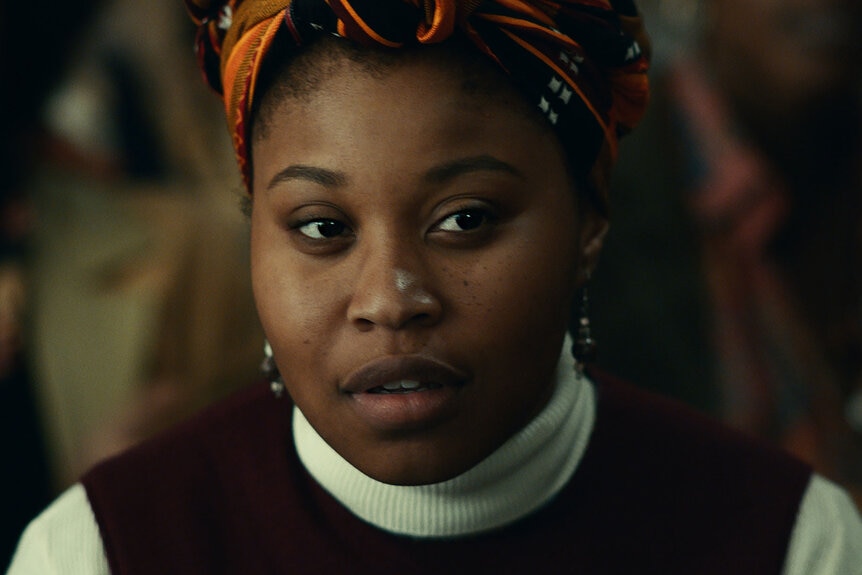Create a free profile to get unlimited access to exclusive videos, breaking news, sweepstakes, and more!
What Happened To Deborah Johnson After The Killing of Black Panther Party Leader Fred Hampton?
Akua Njeri, who went by Deborah Johnson in 1969 at the time of Fred Hampton's killing by law enforcement in his home, has fought for social justice her entire life.

Akua Njeri became an activist as soon as she came of age. She was 12, reportedly, when she awoke to the social issues around her in Chicago. Soon she was marching with Martin Luther King, Jr. and protesting slumlords in the city as a teen. But in the late 1960s, when she was 17, it was her decision to attend an event sponsored by a Chicago college’s Black Student Union that would truly change the course of her life.
Njeri, who went by Deborah Johnson back then, couldn’t convince any friends to join her at the event at Wright City College, as she recalled in a 1988 interview with filmmaker Terry Kay Rockefeller. She’d seen some of the Black Panther Party’s campaigns in Chicago, which included direct action, police oversight, advocating armed struggle against the establishment, and providing free breakfasts for the city’s schoolchildren, among other grassroots social programs.
She’d also seen the BPP’s charismatic rising young star, Fred Hampton, appear on local late-night TV. But attending that meeting made it clear that she had to be a part of Hampton’s movement, and his life. Their relationship and life on the frontlines of Chicago’s BPP are depicted in the film “Judas and the Black Messiah,” out Friday in theaters and on HBO Max.
“I was just really impressed with Fred. He had a really good knowledge of history. He seemed to really be sincere, believing in what he was doing. And their ideas at the time were in agreement with what I believed in and thought in terms of Black people's struggle,” she recalled in the interview. “I said, ‘Wow, these are some bad brothers and sisters, and I want to be a part of that.’”
So she introduced herself to Hampton and soon they were a doting couple. As Hampton rose to national prominence and worked to create alliances with the city’s other emerging leftist groups, she began working on multiple BPP initiatives. These included its well-regarded free breakfast program, the Spurgeon “Jake” Winters Free People's Medical Care Center, for which she canvassed door-to-door and solicited doctors to volunteer time, and the Panthers’ free prison busing program for families of the incarcerated.
“Whatever people were willing to give, it was acceptable to us,” she told Rockefeller. “You did not have to be a Black Panther to give something to the community. And everybody had a talent or something that they can give back.”
On Dec. 4, 1969, Njeri, then 19, was engaged to Hampton and nine months pregnant when a group of law enforcement officers stormed into his apartment on Chicago’s West Side to execute a search warrant for illegal guns. She woke to bullets whizzing past her and Hampton, but he was still out cold — and had possibly been drugged by an FBI informant who had infiltrated the BPP’s top brass. She recalls straddling his body to protect him from the barrage of bullets, which only momentarily stopped when another person in the apartment yelled, “Stop shooting, stop shooting, we have a pregnant woman, pregnant sister in here!"
Njeri was eventually dragged into the kitchen by the officers as other BPP members who were staying in the apartment that night were bleeding out. By several accounts, the officers then entered the bedroom and shot Hampton dead, point-blank.
“I heard a voice come from the area, I guess from the dining room area, which was, the kitchen was off from that area,” she recalled. “And someone said, ‘He's barely alive, he'll barely make it.’ The shooting, I heard some shooting start again. Not much. Just a little shooting, and someone said, ‘He's good and dead now.’"
After the deadly raid, Njeri was arrested and jailed at the local police station. From there she called Bobby Rush, co-founder of the Illinois Black Panthers chapter, who was the one to inform her that Hampton had indeed been killed. After she was charged with two counts of attempted murder and aggravated assault, an outpouring of support helped her and the others arrested in the raid post $100,000 bail. Njeri was released first, as she was about to give birth and under extreme stress. Fred Hampton, Jr. was born on Dec. 29, 1969.
The raid, dubbed the “Massacre on Monroe,” sparked outrage across the city, and conflicting reports of what actually happened that morning went on for months. The survivors of the attack decided that they would not participate in the grand jury inquest into the events that morning as they felt justice would not be served, Njeri recalled.
“At some point, some officer of the court brought in this big plastic bag with the blankets from the bed that Fred and I were in,” she said. “It had blood on it. And he just sat the bag down in front of me. And I remember thinking, these people are not going to drive me crazy. I'm not going to focus on this. But that was like, ‘You don't have to feel any guilt about not participating in this: you're doing the right thing.’”
By May 1970, after ballistic tests and forensics negated the state’s case, charges were dropped against the BPP members. It was also revealed that the raid was carried out by a team involved in the illegal FBI operation, COINTELPRO, that targeted, surveilled, and discredited leftist political groups. A protracted civil case against the Justice Department, Cook County and the city of Chicago went on for the next 12 years, and a settlement of $47 million was awarded to the families of Hampton and the BPP’s Mark Clark, who was also killed in the raid. The survivors received a $1.82 million settlement — which did not concede wrongdoing on the part of the government, a Justice Department attorney said at the time.
Njeri has since continued to dedicate her life to the cause. She has served as the president of the National People's Democratic Uhuru Movement, an interracial organization dedicated to self-determination for Black Americans. And in 1991, her book, “My Life with the Black Panther Party,” which recounts her experiences as well as the deadly raid and its aftermath, was released by Burning Spear Publications.
Njeri also served as the chairperson of the December 4th Committee, which fights to defend and maintain the legacy of the BPP, and she does speaking appearances to discuss Hampton's legacy and continue the fight for social justice. And she continues her lifelong commitment to serving communities in need, coordinating clothing and fresh vegetable drives with the Prisoners of Conscience Committee, a “revolutionary organization” launched by her son while he was in prison after a conviction for aggravated arson, which allegedly took place in the aftermath of the Rodney King verdict in 1992.
Fred Hampton Jr., who was paroled in 2001, says that as he was raised on Chicago's south side, he was instilled with the language and principles of his father’s movement. Now, he's also the chairman of the Black Panther Party Cubs.
“All through my life, my mother always taught me what my father did, the courageous stands he took," he said in a 1998 interview with the Chicago Reader.
For Njeri, it has been the memory of her fiancé and the struggle for social justice after his killing that she says drives her to continue in the movement.
“I used to say that if I gave up, the ghost of Chairman Fred would haunt me to this day,” she told ABC News in 2019. “Because we’re still not free. Power to the people has not become a reality."


























